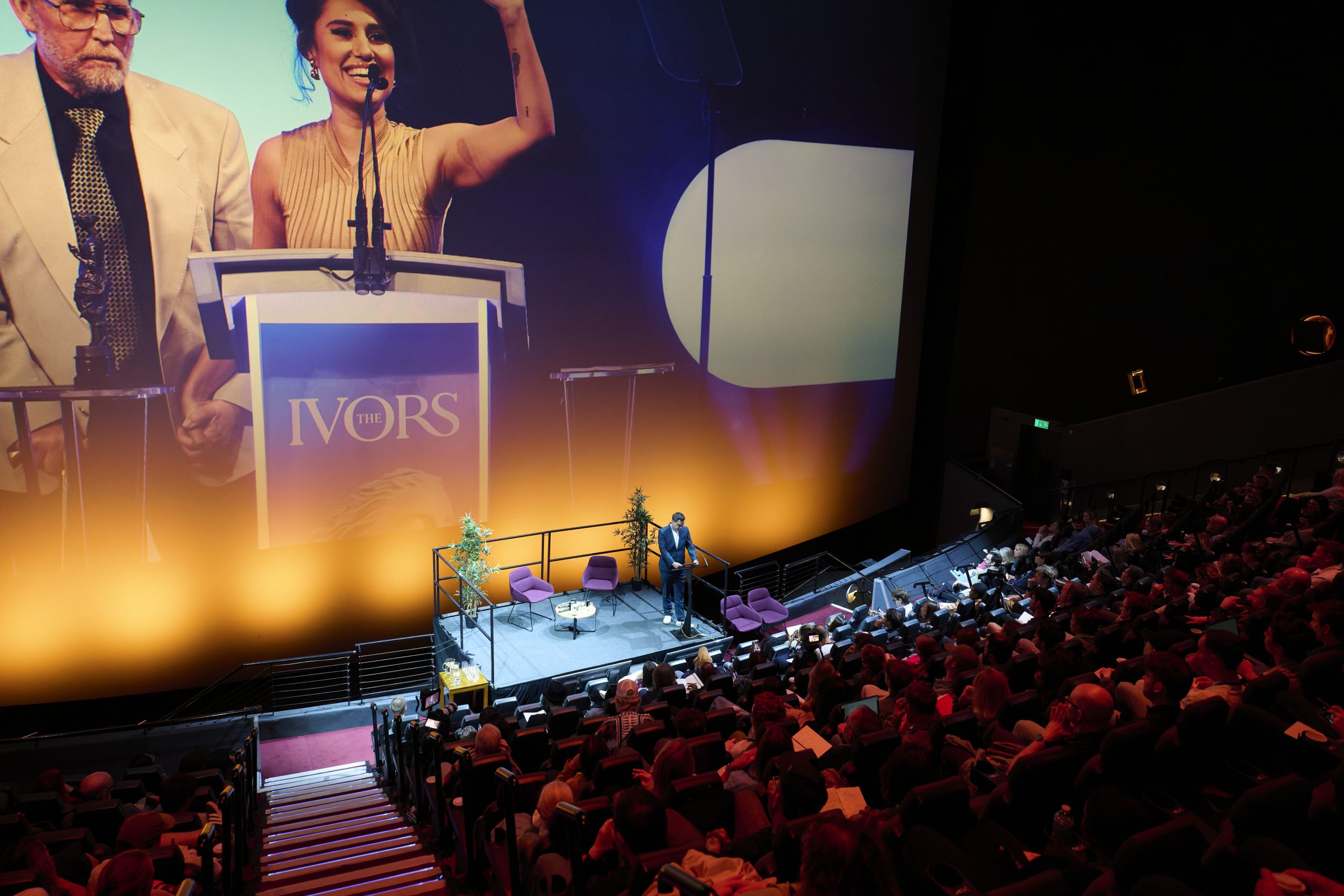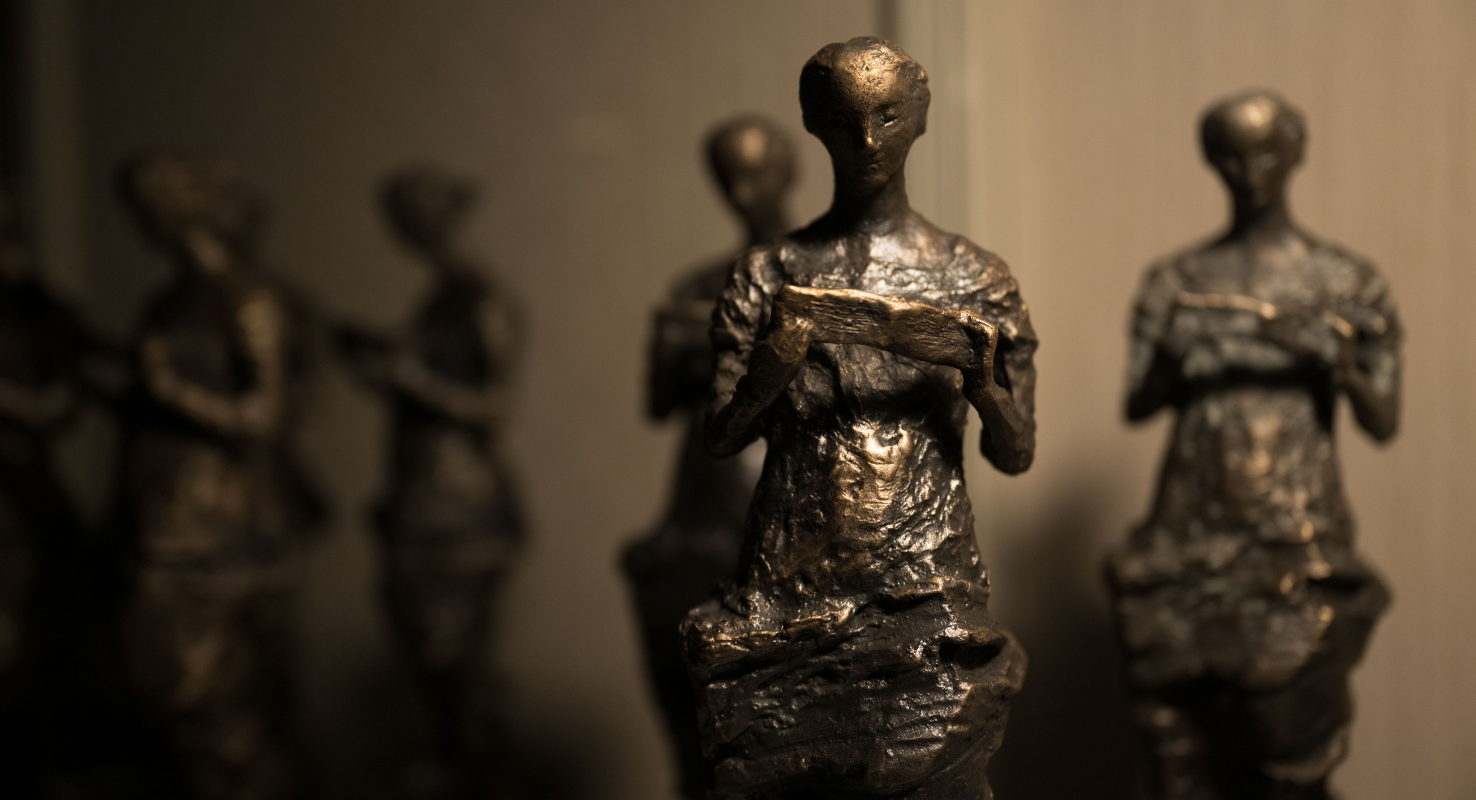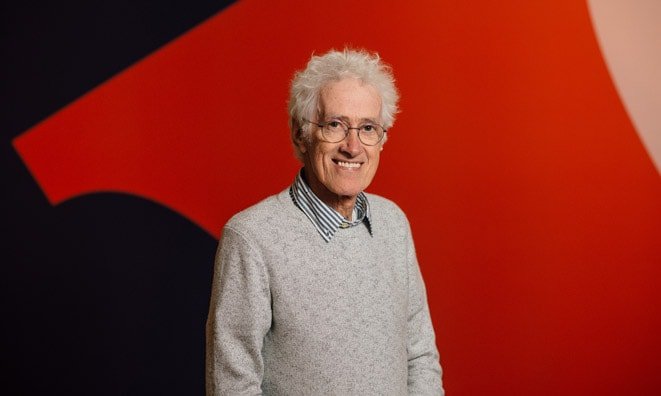Crispin Hunt, Chair of The Ivors Academy
Words were never meant to paint a sense of music. Only to accompany it. Words can't hope to interpret the melody of our dear friend, musician, inspiration, mentor, thinker, innovator and visionary Rupert Hine.
Rupert passed away on 4th June 2020 at his home, with his family beside him, after a fearless, defiant battle with cancer. On this, the day of Rupert's wake, we are privileged to publish these beautiful tributes to Rupert by one or two of the many, many friends and creators he energised and nourished.
The Ivors Academy is deeply indebted to the great Sir Bob Geldof for his exquisite, agonising homage. To Alan Graham, Rupert's dear friend, tech-genius and business partner in One-Click Licence : a viable technological remedy to the pains of the digital world. To our friend, Dan Adams of Apple Music, whose chance meeting with Rupert's testament to the life-affirming impact he had on so many of us. Thank you all and to all those who have written kindly to share their grief.
People should understand Rupert's influence both in music and innovation. His role in the genesis and development of MIDI - the protocol beneath all creative music software - means his creative ghost is alive in every machine, forever woven into every piece of modern music production, as it should be. His song, his sound, his influence, his motive is everywhere. The Ivors Academy will fight always for Rupert's dream: the life, love and liberty of creativity and creators.
I went to see Rupert and Fay just before he passed: he was close, conscious but not, as if his wild and beautiful spirit were gathering its belongings ready to leave. Shining, generous, excited, almost. Mute but quick, always. Fay, the love of his life was wondrous, strong. We will miss him forever at The Ivors Academy and beyond.
Sir Bob Geldof
Rupert Hine was a late 40’s Elstree Studios film. He was so quintessentially English David Niven would have seemed positively foreign beside him. He had that charming bumbling diffidence around women that Hugh Grant has made a career from and which combined with the precision of his accent, language, attitude, manners, kindness and humour marked him out as one of nature’s gentlemen. He was certainly that.
[content_image image="https://ivorsacademy.56degrees-dev.co.uk/wp-content/uploads/2020/06/Rupert-Hine-APRS-Award_661x396.jpg" description="Rupert Hine receiving his APRS Fellowship Award - with Bob Geldof and Sir George Martin © Gilead Limour (APRS) 2011"] [/content_image]
There were also of course the standard enthusiasms of the type. The adoration of old British bangers reeking of dripping oil, leaking petrol and scuffed black leather seats that could rarely go more than a mile or two without the inevitable stutter, stall and stop. A soft muttered “oh blast’ from the drivers seat. Followed by a vastly interested yet irritated peering into the density of some clapped out Jaguar engine, the cathartic slamming of the bonnet, the half turned staring into the distance wiping of the oil blackened hands, the returning to the driving seat, the staring ahead, the turning of the head to the expressionless passenger, the sheepish apologetic grin and the ‘there were only two of these ever made you know”! One could see why.
The same was true of aeroplanes - all vintage, all hopeless mechanical wrecks, all harking back to some mythic Terry Thomas vintage Britain. I bet somewhere there’s a secret stash of Roops Beanos, Dandys, Hotspurs and Eagles.
So far so true and so true to form. Where Rupert (or Roop or Rudepart or Rhubart etc depending on whatever Goonish/Pythonesque identity he wished to assume at that moment) breaks definitively away from type is in his towering passion and inexhaustible knowledge of and for music.
Again there is a type who like Roop are interested in machines and structure and predictable mathematical formulae who love the ‘construction’ of music. They ponder upon theory and arcane musical form, they ‘understand’ and they ‘appreciate’ the formal mechanics of Composition. They ‘get’ Stockhausen and the moderns and yes while it is indeed interesting it is also very hard - at least for me -to feel this music. Rupert did feel it and more than that Rupert was one of the few people I’ve ever met who counter-intuitively could imbue any music he wrote, performed or produced with soul. He drowned in feel.
He was endlessly open to all and any expression of music. There was nothing he didn’t get or appreciate. He loved as much the raw thrashings of some 2 week old band of provincial oils as he did the smooth Californian melodies of Stevie Nicks, the raw soul of Tina Turner, the textured electronics of Howard Jones or the Thompson Twins, the brittle guitar of The Fixx, the ramshackle noodling of Bob Geldof and all the many, many acts he guided to their hit records.
More though than appreciating and understanding music he believed in it. He was enthralled by music. By its power. Its language. He believed it to be an instrument of change and he was completely in love with anyone who could, like him, actually write and make the stuff. Which is why if you ever wanted to raise the normally equable Hine mood and temperature one had merely to suggest any form of exploitation of the artist by publishers, record companies, streaming platforms etc etc and his bizarrely gaunt, lantern-chinned face would go rigid with rage and a passion normally almost invisible save in music would burst forth in a flooding torrent of brilliant language and invective. He loathed anything or anyone who stood between the artist and the music and the just desserts thereof.
He was a wonderful collaborator. Vastly generous of his ideas, musicianship, writing skills and technical savvy. He could entertain and make tangible the wildest or most sensitive notions of whomever he was working with at any moment. He would listen with deep concentration to even the vaguest mumblings of what it was the writer or performer intended and then either suggest amendments usually for the better or make real that which had being merely inchoate in the originator in the first place.
For me it is simple. Rupert restored my confidence in myself as a songwriter and didn’t care about my limitations as a singer. All that was to be worked with and made into something expressively singular to the artist involved. In this case myself. He would drag from me final compositions that I was initially just hinting at. He would coax me to performances I was hitherto incapable of. Understanding my many minuses as well as few pluses he put around me musicians who could follow along this ham-fisted, left-handed, upside down, back to front guitar player. And that just about describes my songwriting style as well! For the first time in my life in a recording studio I had fun. Rupert was the best fun to be around.
[content_image image="https://ivorsacademy.56degrees-dev.co.uk/wp-content/uploads/2020/06/Rupert-Hine-Fay-Hine_The-Ivors-Academy-Gold-Badge-2019_photo-c-Mark-Allan_661x396.jpg" description="Rupert Hine with wife Fay at the Gold Badge 2019 © Mark Allan"] [/content_image]
Of course with One World One Voice he put all his mad, eccentric, wonderful and thrilling ideas into practice. Way ahead of its time he simply took a piece of music and sent it off around the world to assorted musicians of every type, style and genre under the clear belief that music was the sole universal language, understood far beyond the limitation of language. That this was where the sense of being human found a commonality and a common understanding. He was right. The result was a triumph. Today it’s a commonplace to fire a track down the wire and people stick stuff on it but back then and because it was outside any centralised control it became a sort of musical Chinese whisper. Something that endlessly mutated, bent and warped depending on who next added to it.
There are many people who only intellectualise music. There are also many musicians who believe you can’t intellectualise music. That it is and can only ever be true when it is “feel”. Both are correct and wrong simultaneously. You can do both but equally you can do both together. Theory and practice are not mutually exclusive. Rupert Hine was the living musical embodiment of that reality.
As in music so to in life. He was the best fun. He was a laugh. He was a very serious thinker. He was a musical activist constantly working for and arguing for the rights of both music and musicians. He was breathtakingly articulate and heartbreakingly vulnerable all under that skeletal frame.
Like those English archetypes mentioned above he had great difficulty expressing the love he so loved being in. Around the women he has loved however it was self-evident and he did indeed love les filles. He charmed them with his accent and engaged them with what appeared to be a debonair manner marred only by a sort of cute bumbling in the face of mad beauty. A pretty good pulling combo. But the pain and hurt of love were also shirt-sleeve staining. It would be evident what was going on simply by the absence of the lack of joy on that strange compelling face. The fact that the last 12 years of his life were fulfilled and content is fitting recompense for all he bestowed. He was a great companion and much more importantly he was the best of friends.
As I’ve said he was a gentleman. He was a dude. He was a very brilliant talent. He was hilarious. He was a fabulous musician. He was beyond generous of his time and talents. He adored the world of music. All of it. The prosaic mundanity of legalese, accounting, management, contractual, union membership, royalty rights, copyright, prs, streaming, format, electronics, recording techniques, record companies, award committees, A&R, equipment and the electrifying vividness of creation and completion. Is there or has there ever been anyone so completely immersed so fully engaged and interested in that total world, our world, before? I cannot think of anyone. Literally no-one who has achieved as much in our game, in our profession. All of it to him an all-consuming passion.
And that’s where we part from the Elstree English stereotype. For all of those stereotypes are essentially gadfly. Passionless men engaged in the dance of politesse and manners with little central core. Rupert Hine was all soul and heart fully, passionately, all-consumedly bound to music and its doings. He could do it all. And he did. And worst of all..my mate has gone.
Dan Adams, Apple Music
In 1993 I was 17 and directionless, but with a passion for music that needed nurturing. Of all people, my mum (another story for another time…) managed to sneak me in to Metropolis studios in Chiswick for an evening, where it so happened Rupert was recording an album with Phil Palmer, Tony Levin, Paul Carrack, and Steve Ferrone. Wow.
I sat there at the back of studio C, watching these musicians, each of them legends in their own right, watching how they worked together to make a record, and thought “Oh yes! I am having some of THIS!”
Rupert was performing, but also producing. Most people try their whole lives to be good at one of those things, let alone great. Rupert was both. Despite running the session and recording takes, he was so kind, he listened, and gave me advice on how to find my first steps in the music industry. I remember leaving the studio like it was yesterday. That night - and his advice - directly inspired me to enrol in sound engineering college, become a recording engineer then, like a master tape, move on from the studio to a label.
Now I’m in my 13th year at Apple, working so proudly amongst the two things that Rupert and I talked about at Metropolis 27 years before: Music & Technology.
Fast forward to recent times, and our paths met again. I got to work with Rupert through our partnership with The Ivors Academy, and we enjoyed dinners, talking music and life.
I told him the story of our brief but inspiring (for me..!) Metropolis meeting back in the 1990’s. He was happy and amused that a quarter of a century ago, he’d made such a brief but crucial contribution to my life. It comes as no surprise to learn that I was not the only one. Many, many others have had a similar experience with Rupert over the years.
One thing he wrote has stayed with me. He said;
"The sentient beings that we are, cannot live without music. Even one of the last tribes to be discovered on Earth had a fully developed musical 'system'. So we, the musicians and music-lovers, are at the essence of 'us'. And Dan - that's not a bad place to be."
Farewell Rupert, thanks for the direction.
[content_image image="https://ivorsacademy.56degrees-dev.co.uk/wp-content/uploads/2020/06/Rupert-Hine-Fay-Hine-and-Marc-Sylvan_British-Composer-Awards-2018_photo-Mark-Allan-2_661x396.jpg" description="Rupert Hine with wife Fay and Marc Sylvan at The Ivors Composer Awards 2018 © Mark Allan"] [/content_image]
Alan Graham, OCL
There will be many tributes from all sorts of people in the coming weeks about Rupert Hine. There will be those who talk about his unmistakable genius as an artist, and others might talk about his talent as a record producer, but as Rupert's business partner-in-crime for over 7 years, I knew Rupert in a very different way, as not just a friend, but as someone with unique insight into his advocacy for creators.
Starting as pen pals who became lunch pals, Rupert and I found commonality as the “tech guy who loved music and the music guy who loved tech”, who were worried about the very survival of an industry struggling to support those that fuelled it with their art. We naively thought that, armed with a good idea, we could help right some of the wrongs and help fix the imbalance between the tech industry and music.
During this time, two moments stand out. First a conversation where Rupert and I were discussing an offer he had turned down to produce a project. I asked him why and he told me that he wanted his legacy to be ensuring there was a future for artists. He didn’t want or need another credit on his CV if there was no hope of a better world for artists.
The second moment was when he was thinking of running for the Board of what was then called BASCA (The Ivors Academy), and asked what I thought. I enthusiastically encouraged it, because his passion for change was larger than could be contained by any one project, and we both knew he was needed there as well.
Rupert is arguably best known as a record producer. But if you asked him, Rupert saw himself first and foremost as a songwriter. “Painting pictures with sound,” he’d say. He loved composers and songwriters, and I know he was proud of his time with The Ivors Academy, their work, and their mission.
Rupert never cared about money or prestige. He was never a self promoter. In fact you often had to do that for him, because even though he loved being recognised for his work, he had no interest in fame. Fame was only an instrument to be able to talk about the work, the art, and the artists.
Rupert wasn’t just a friend to many of us, he was an inspiration, and I’m not sure how to go forward without him. However, I’ve had the opportunity to have been around Rupert when he was mentoring many an up and coming artist, giving each one a singular piece of advice. Advice I plan to take each day going forward.
“Write the best song you can write, the song only you can write”.




